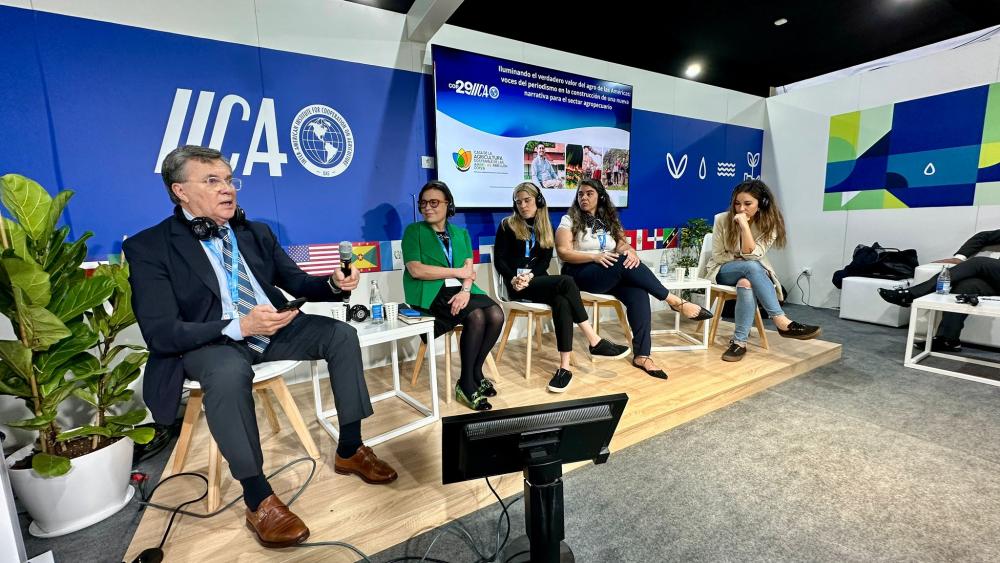Convened by IICA, journalists contribute strategies at COP29 to build a new narrative highlighting the value of the agricultural sector in the Americas

BAKU, Azerbaijan, 15 November 2024 (IICA) – The Director General of the Inter-American Institute for Cooperation on Agriculture (IICA), Manuel Otero, and journalists from Argentina, Brazil, and Spain discussed the creation of a new narrative to highlight the true value of the agricultural sector in the Americas, which is vital for global food security and environmental sustainability.
IICA has been working to build this narrative by bringing together political and academic authorities, as well as experts, technical experts, and farmers, to emphasize the indispensable role of rural producers and reposition this strategic sector for the development of Latin America and the Caribbean.
“Shining a Light on the True Value of Agriculture in the Americas: Voices from Journalism in Building a New Narrative for the Agricultural Sector” was the title of the panel, featuring journalists Silvia Naishtat from Clarín (Argentina), Pilar Vázquez from La Nación (Argentina), Fabiola Sinimbu from EBC/Agência Brasil, and Marta Montojo from EFE (Spain).
IICA’s Director General opened and closed the conversation, summarizing the Institute’s actions in building this new narrative to move away from outdated perspectives and spotlight the strategic value of agriculture in the Americas.
According to IICA, addressing the interaction between agriculture, climate variability, and biodiversity loss—issues that are shaping new public policies worldwide—requires a new narrative that promotes more efficient resource use, reduced greenhouse gas emissions, greater resilience, and higher productivity.
“There are developments on the international stage defining a new food-oriented geopolitical landscape and placing agriculture at the top of the global agenda. This cannot go unnoticed for a continent that is the world’s largest food-exporting region and holds the majority of natural resources,” said Otero.
“To seize new opportunities, we must recognize the need to build a new narrative. The harsh reality is that we are still dealing with the negative effects of an old narrative, which continues to associate agriculture with an extensive, extractive sector with weak ties to the broader economy and, in some cases, links to environmental and social problems. We need to break this vicious cycle and initiate a virtuous one by identifying elements for a new narrative that conveys a more positive and ambitious vision of agriculture,” Otero added.
Silvia Naishtat, also an agronomist, explained that “In Argentina, the agri-bio-industrial chain accounts for 60% of our exports, yet it occupies a very small space in the media. There are extraordinary stories in AgTech, but they receive little coverage. Journalists have a moral duty to change this perspective.”
“I think IICA's decision to promote a new narrative is extraordinary and necessary. Journalists don’t build narratives; they provide information. News always reflects the views of its publishers, but we don’t construct narratives. Today we live in a more fragmented society where many people no longer get their information from traditional media but from social media platforms,” she added.
Fabiola Sinimbu, from Agência Brasil, spoke about how agricultural activities are covered in her country, driven by the proactive role of ministries involved in the sector's agenda. “To build the new narrative for agriculture in the Americas, it’s essential to share the initiatives and stories of farmers contributing to the planet's future,” she said.
Marta Montojo, a journalist with the EFE agency and EFE Verde, noted that coverage of the agricultural sector often revolves around a conflict-driven agenda. “We’ve covered protests across Europe against European environmental measures, which gave visibility to the various demands. However, we must be cautious about creating dichotomies between farmers and the environment,” she stated.
Pilar Vázquez explained that “conveying the reality of agriculture to people unfamiliar with the sector requires telling the stories of farmers who work every day to bring food to the tables of those living in cities. We need to show everything that exists behind agriculture: a great deal of innovation and efforts to ensure sustainability. Communicating about agriculture is a challenge for journalists.”
The event was moderated by IICA’s Communications Advisor, Guido Nejamkis.
As part of building this new narrative, IICA fosters partnerships and debates. In September, in New York, researchers, political leaders, international organization executives, and representatives from the private sector and civil society participated in an unprecedented debate on the paths to creating this new narrative, convened by Columbia University and IICA.
The topic was also addressed by IICA’s Director General at the 2024 Norman Borlaug International Dialogue, organized by the World Food Prize (WFP) Foundation in Des Moines, Iowa, highlighting the need to build a narrative showcasing the true face of a sector that produces food, fibers, and energy for the world, while also preserving biodiversity and working to mitigate climate change.
More information:
Institutional Communication Division.
comunicacion.institucional@iica.int